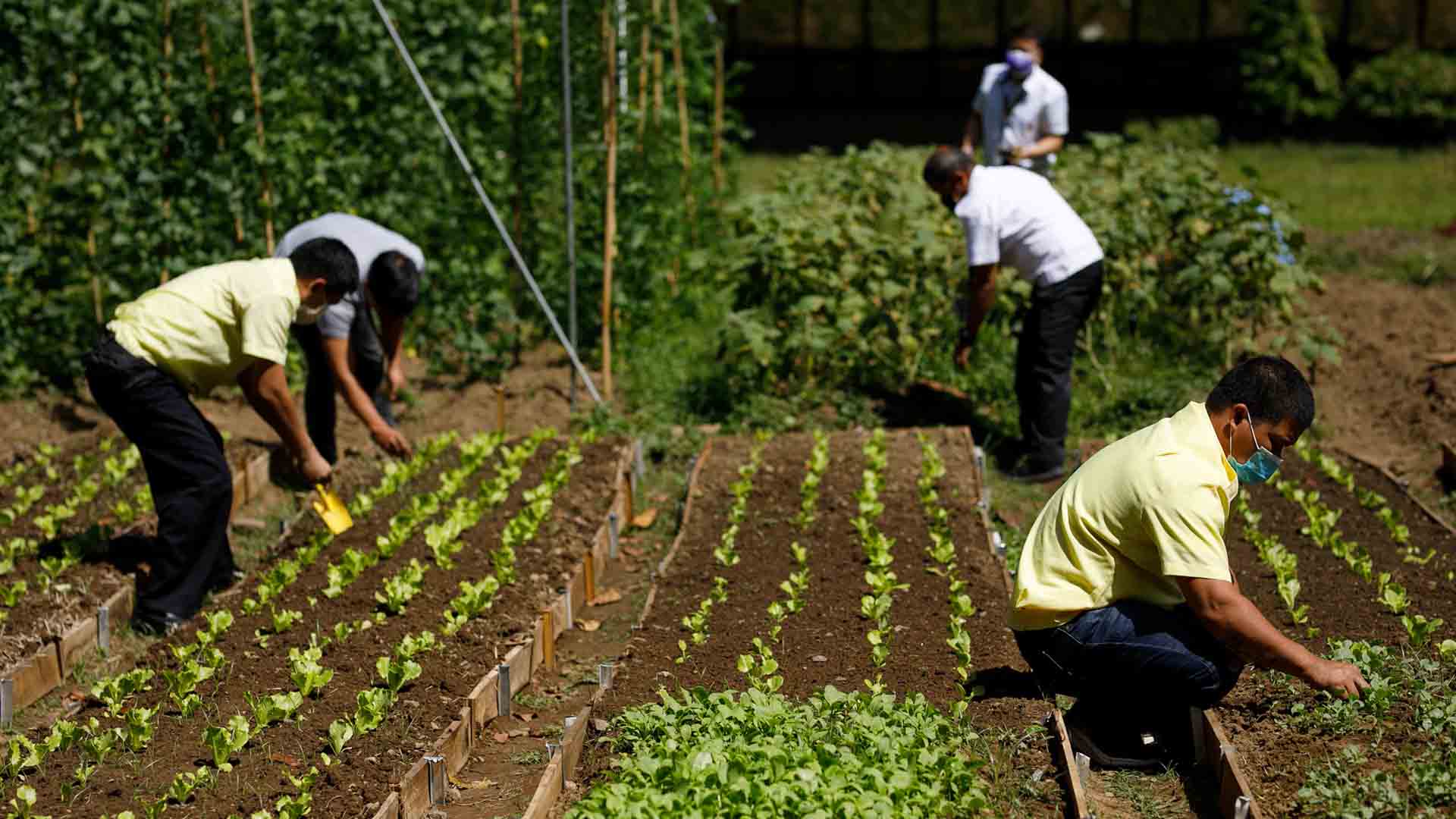Every week, armed with scissors and crates, around twenty-five maintenance and security staff at San Miguel Corporation’s (SMC) head office complex in Ortigas trudge muddy paths behind the company’s iconic, Manosa-designed building, their chatter and laughter filling the air.
With this as their backdrop, they comb neatly-arranged vegetable beds, eager to accomplish one of their most important tasks for the week: harvest their very own urban farms.
Together, they comprise the first batch of participants in the company’s “Backyard Bukid” urban farming project where each is given a plot to grow their own vegetables and use their harvest to either augment their own food supply, or earn extra income by selling them to other employees.
Productive use of idle land
A full year since the project was green-lit by SMC President and Chief Executive Officer Ramon S. Ang himself, it has more than lived up to its purpose of making productive use of idle land at the head office property.
The SMC Backyard Bukid has already produced over 300 kilos of bokchoi, camote, eggplant, kangkong, green lettuce, romaine lettuce, mustard, okra, siling labuyo, pechay, cilantro, winged bean, and kale.
“Our goal is to create an environment where our employees and support staff can learn new skills and gain new experiences to help them become more resilient and self-sufficient especially in these uncertain times. We have similar ongoing programs at some of our host communities in the provinces. This version at our head office is much smaller in scale, But every small effort goes a long way, especially when people are having a hard time,” Ang said.
When asked how the urban farm has helped him, Nestor Reofier, a member of SMC’s maintenance staff, shares: “Nagkaroon po kami ng pagkakataon na madagdagan ang aming kaalaman sa tamang pagtatanim at pag-aalaga ng gulay. At higit sa lahat po, ang paggawa ng fertilizer at spray sa mga tanim para iwas sa peste. Natutunan ko din po na kahit maliit lang ang lupa, pwede ka rin pala magtanim at pwede mo ito pagkakitaan.
(“We learned how to grow vegetable the right way. More than that, we also learned to make our own fertilizers, to counter pests. We learned that you can plant and make money even on a small plot of land.”)
Andy Detorres, one of SMC’s messengerial staff, highlights how teamwork is key to making this project successful: “Lahat po tulong-tulong sa proyekto para mas mapalaki o mapalawak pa. Dahil ang bawat isa rin naman po sa amin ang makikinabang pagdating ng panahon. Ang pinakagusto ko pong bahagi sa Backyard Bukid yong nakapag-harvest na po kami ng mga itinanim namin, tapos mabilis rin po namin nabebenta sa mga empleyado yong gulay, kaya po may pumapasok na po na extra income.”
(“Everybody helps out to make sure we maximize the project. We know all of us will benefit. What I like most about the Backyard Bukid project is that we’re able to harvest and sell the produce quickly to other employees. We get extra income.”)
Agri-entrepreneurship, mentoring
Participants of Backyard Bukid project were put through a one-month agri-entrepreneurship training and mentorship program with the School for Experiential and Entrepreneurial Development (SEED) Philippines. They learn about organic vegetable production, soil management, and pest and disease management.
Today, participants visit their plot of land twice a day, six times a week. For each visit, there is an assigned team leader; others are assigned to sow seeds, water the plants, apply organic fertilizer, and remove weeds.
Once the vegetables are ready for harvest, each participant contributes to the selling process, with tasks that include gathering and consolidating orders, purchasing commodities, repackaging and delivering orders, and maintaining records.
Mentors from SEED are also at the site every day to guide participants and help ensure that the urban farm is thriving.
Participant Jessie Nanbat shares how grateful he is to be a part of the project: “Taos puso po kami nagpapasalamat sa SMC at kay Sir Ramon Ang dahil nabigyan po kami ng oportunidad na maging bahagi ng Backyard Bukid. Sana po magtuloy tuloy ang succees ng proyektong ito.”
(“From the bottom of our hearts, we are grateful to SMC and sir Ramon Ang for giving us the chance to be part of the Backyard Bukid project. We hope the project continues to be a success.”)
In recent months, participants have also tried their hand at trading, since demand for Backyard Bukid vegetables has been higher than supply.
Every week, they compile a list of orders from employees and work with Silong Kabataan Community Farm Enterprise to augment their supply and sell these for a profit. From this, they learn about farm and supply chain management and agri-enterprise development.
Renn Inopia, one of SEED’s mentors assigned to the Backyard Bukid project, shares his own experiences working on the project: “My most memorable interaction with the participants was their first harvest. They were filled with hope and joy and were excited to produce more. ‘Tanim pa tayo para mas marami mabenta natin’ (Let’s plant more to sell more) are words I would often hear from them. And every time they sell their produce to other employees, they proudly say ‘organic po yan mam/sir.'”
He adds: “Apart from growing food, Backyard Bukid has built a sense of community among participants. It has become a place for them to connect and work together for a common purpose. My hope is they sustain the program, grow from it, and inspire others to engage in sustainable farming.”
Food insecurity and the pandemic
The COVID-19 pandemic has had a profound impact on every aspect of the global economy, including food security. The extended lockdowns disrupted food supply chains, altered produce prices, widened inequality, and affected income and livelihoods. In many instances, food has become out of reach for many.
In the Philippines alone, some 62.1% of households experienced moderate to severe food insecurity in 2020 amid the ongoing pandemic, according to a survey conducted by the Food and Nutrition Research Institute.
To help address this, the national government and various non-government organizations launched programs promoting edible landscapes in urban communities as an additional source of available, fresh, and nutritious food. Government has also passed legislation to advance urban agriculture nationwide, and help boost the country’s food security.
As one of the country’s largest and most diversified conglomerates, San Miguel Corporation has launched numerous initiatives to help farmers and agriculture workers throughout the pandemic.
When the country first went into lockdown in 2020, it enabled farmers to open Kadiwa ni Ani at Kita pop-up stores at its Petron gas stations throughout Metro Manila, allowing them to sell their produce directly to consumers, and prevent food waste.
It also increased its purchase of local crops to support farmers and cooperatives. It even purchased excess dairy production and donated these to poor communities, to avoid spoilage and financial losses for carabao growers.
It also partnered with social enterprise Rural Rising to put up Better World Diliman, a ready marketplace for excess produce from all over Luzon which likewise aims to avoid food waste and help keep farm incomes up. It is, however, the company’s Backyard Bukid initiative, that has had a direct impact on the very people providing everyday services to the company and its employees.
As SMC’s Backyard Bukid program continues to grow, SMC’s own hope is for more businesses and individuals to be encouraged to transform urban spaces into functional eco-spaces, and help agriculture flourish.






